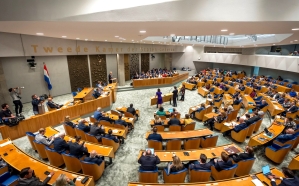
The Evangelical Alliance in the Netherlands has sounded alarm over the potential of a new ban on “gay conversion” practices passed by Dutch lawmakers to threaten pastoral guidance.
The Christian Democratic Appeal (CDA) initially blocked the proposal by the social-liberal Democrats 66 and liberal People’s Party for Freedom and Democracy (VVD). The bill’s proponents, however, tempered wording so that guidance against changing sexual orientation would be illegal only if creating severe psychological stress or if systematic or intrusive.
This amendment led to the Christian Democrats supporting the bill, which passed the “Criminalization of Conversion Acts Act” at the lower House of Representatives (Tweede Kamer der Staten-Generaal) on Thursday (Sept. 9). It still needs approval by the upper House Senate to become law.
MissieNederland, the evangelical alliance in the Netherlands, confirmed on LinkedIn before the vote that it had contacted political parties and others including churches “because the bill raised many questions and concerns.”
Although the alliance supported not trying to manipulate someone into changing their sexuality, the evangelical group has been concerned about the ban’s effect on church pastors.
“We embrace the good points (for example, no conversion therapy or guidance that forces or manipulates someone into changing identity), but if we notice that the pastoral space is at stake, we sound the alarm again,” the MissieNederland stated. “In our opinion, there should be room for voluntary guidance and prayer for people who are searching or struggling with sexuality and/or gender appropriate to their own beliefs.”
Before the vote, MissieNederland issued a press release (Sept. 8) explaining its position as an umbrella organization of evangelical Christians, churches and organizations. The group rejected any form of therapy in which people are forced, coerced, subject to violence or manipulated to change their sexual or gender identity.
“We also believe it’s important that people who wish so can receive pastoral care that aligns with their own faith, and that pastoral workers can offer this care freely,” stated MissionNederland. “Freedom of conscience and religion are fundamental rights that deserve to be protected.”
The group conceded that the bill’s explanatory memorandum includes mention of freedom of religious practice but noted that concern remained about the bill, despite clarifications in the amendment.
“Precisely because it concerns themes that touch upon people’s deepest identity, the utmost care and clarity in wording are essential,” stated MissionNederland, which asked its members to give examples of pastoral care that could become punishable.
“While there are varying interpretations of the legal implications of these practical examples, we find that the bill itself raises debate, uncertainty and concerns,” the leaders stated. “We consider this undesirable.”
The evangelical body questioned how the bill could be interpreted in certain scenarios, such as whether advising that choosing a celibate lifestyle would be considered “oppressive.”
“The concerns shared raise a broader issue: when legislation is not readily interpretable, there is a risk that pastoral workers will, as a precaution, reject certain conversations or support,” they stated. “People struggling with their sexuality and seeking guidance may therefore find themselves facing a closed door. We find this worrisome and undesirable.”
The leaders said that although the bill was passed in the House of Representatives, they were grateful that a large number of their objections and recommendations emerged in the debate.
“We are also grateful for the constructive cooperation with the various political parties, churches, organizations and individual participants,” they said.
Leaders at MissieNederland pledged to “keep a close eye on the progress of this law” and discuss its development with political groups.






